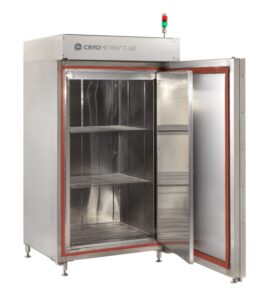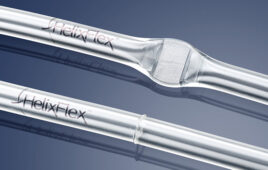 Reflect Scientific’s Cryometrix T-160 ultra-low temperature freezer is designed to be a safer, more reliable and more efficient option for the pharmaceutical and medical industries than cryogenic freezers requiring liquid nitrogen. The refrigerator also replaces the compressor and refrigerant design present in most biorepositories.
Reflect Scientific’s Cryometrix T-160 ultra-low temperature freezer is designed to be a safer, more reliable and more efficient option for the pharmaceutical and medical industries than cryogenic freezers requiring liquid nitrogen. The refrigerator also replaces the compressor and refrigerant design present in most biorepositories.
The upright liquid nitrogen freezer boasts adjustable temperatures from +20°C to –160°C, providing faster freeze times than traditional upright freezer options. The freezer also offers temperature uniformity of ±7°C, ensuring sample preservation.
Eco-friendly design and other features

Cryometrix T-160
The manufacturer notes that the Cryometrix freezer is eco-friendly, with a simplified design and minimal moving parts. It says the design supports reliability and lowers maintenance costs. Reflect Scientific also offers a 20-year warranty on the cooling system.
The freezer minimizes the risk of sample warming and deterioration related to door events. The temperature and data logging can be readily accessed, and multiple security levels can be set for enhanced sample protection. The redundant cooling system and onboard seven-day battery backup ensure uninterrupted processes even during a power loss.
It also offers automatic tracking of temperature and other data.
Furthermore, the Cryometrix freezer is said to use up to 90% less energy than mechanical, compressor-based units, lowering operating costs. The freezer also eliminates the need for expensive HVAC systems as it doesn’t emit heat into the room.
The ultra-low temperature freezer offers a redundant emergency valve for use during a power outage to maintain the temperature in the payload bay.
Compact design
Its compact design is suitable for space-constrained storage environments.
The ultra-low temperature freezer measures under 8 ft2.
Reflect Scientific also offers products supporting a range of life-science applications, including plasma freezing, CAR-T cell storage, stem cell storage and various cGMP processes.
The company’s blast freezers can quickly freeze and thaw temperature-sensitive materials during R&D for new drugs, vaccines and biologics. It also supports temperature profiling, which can shed light on how products will handle temp changes during transport, storage and distribution. Blast freezers also store blood plasma, cryoprecipitate, vaccines and other substances.





Tell Us What You Think!